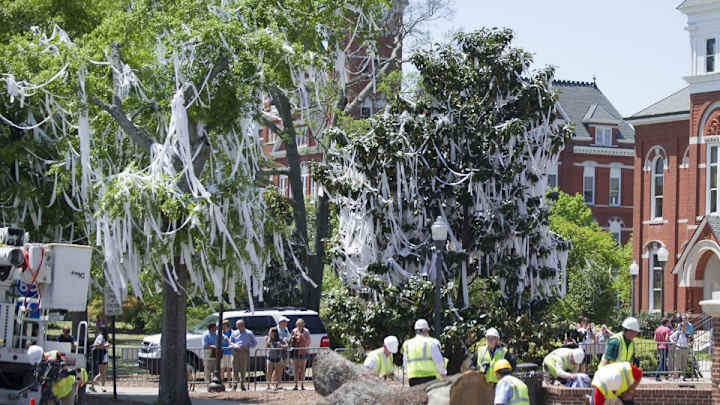Auburn to plant new trees at Toomer's Corner in February

Two new oak trees will be planted at Toomer's Corner next Feb. 16, Auburn announced Friday.
The school contracted with a South Carolina nursery earlier this year to begin the process of preparing the trees to be planted at the historic intersection of College Street and Magnolia Avenue. The trees are each about 35 feet tall and have about a 30-foot spread.
Though the oaks are mature, fans won't be allowed to resume Auburn's rolling tradition for at least a year after they're planted.
The new trees will replace the 130-year-old oaks that the school removed after Alabama fan Harvey Updike poisoned one of them in the fall of 2010, thus ruining the soil. Updike, who was outed as the poisoner after he admitted to the crime under a fake name while calling in to "The Paul Finebaum Show," was convicted in March 2013 and released from jail in June 2013.
• Week 11 picks: Auburn-Texas A&M, Alabama-LSU and more
After trying to save the trees, Auburn was forced to have them removed in April 2013. Fans rolled the oaks one last time after Auburn's spring game earlier that month. The area was declared poison-free in May of this year.
As part of the university's renovations of the area by Toomer's Corner, 30 trees that are descendant from the original oaks will be planted along a new brick walkway that connects Toomer's Corner to Samford Hall, a main campus building.
The trees were initially planted in 2002, when Auburn's School of Forestry and Wildlife Sciences took acorns from the Toomer's oaks and planted seedlings in an orchard on university forest property. They'll be transferred to the area by Toomer's in 2016.
• Ultimate college football TV guide for Week 11
An Auburn tradition, "rolling Toomer's" involves students and fans covering the iconic oak trees with toilet paper after a big win or other celebratory event. The tradition first began in the early 1970s.
- Ben Estes
